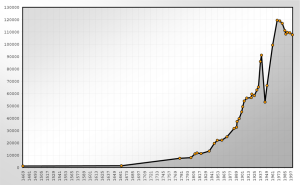Last week I read a Thought Catalogue blog post entitled Five emotions invented by the internet and laughed so hard I snorted the coffee right out of my nose and onto my computer screen.
I have certainly experienced “a vague and gnawing pang of anxiety centered around an IM window that has lulled”, but this one was my favourite:
The state of being ‘installed’ at a computer or laptop for an extended period of time without purpose, characterized by a blurry, formless anxiety undercut with something hard like desperation
Who hasn’t felt this way when working to deadline but unable to overcome the urge to check email/twitterfeed/facebook/google scholar or whatever? There’s something wonderful about discovering others share your own nameless fears and anxieties.
I started to wonder: what new emotions does a PhD make possible? I explored this idea by writing some new PhD emotions and testing them on my PhD student twitter followers like so:
Irrational feelings of love for academics you have never met because their work helps you in unexpected ways #phdemotions
For those of you not into twitter, the hashtag (#) enables users to make a ‘conversation’. Anyone who included the #tag allows their tweets to be read as part of the same ‘thread’. As I hoped, other people followed my lead and started to post their own #phdemotions and a minor meme developed.
 Later I nerded out and did a content analysis of sorts to see if I could develop a PhD ‘mood-o-meter’ from all this twitter action (aren’t you lucky my employer pays me to do this sort of stuff?).
Later I nerded out and did a content analysis of sorts to see if I could develop a PhD ‘mood-o-meter’ from all this twitter action (aren’t you lucky my employer pays me to do this sort of stuff?).
According to www.hashtag.org there were 130 tweets containing either #phdemotion or #phdemotions from last Friday to this Tuesday. After massaging similar emotions together I counted a total of 71 distinct emotions.
Now to work out which ones seemed to resonate the most with the audience. If a person really liked the#Phdemotion someone else came up with they could retweet it (add it to their ‘stream’ for others to read) or @mention it (have a conversation with someone else about it). I counted these and added a multiplier if the emotion was both retweeted and mentioned.
Using these scientific (*ahem*) measures for popularity, here are the top 5 emotions made possible by doing a PhD (at least, as determined by PhD students who happened to be on Twitter between the 14th and 18th of January):
1) Elation when you realise you know more than your supervisor about your topic and you feel brave enough to argue about it
This was an amalgam of tweets by @scientistmags, @soilduck @choloe_kitten. It’s not that surprising that this is the most recognised emotion since ‘scholarly independence’ is meant to be the goal of PhD study. I was happy that a positive emotion came out on top
2) Fear of being ‘found out’ as fraud, not really knowing enough/being smart enough to be Phd student (@orientalhotel)
Otherwise known as ‘the imposter syndrome’ (thanks @boredpostdoc) this is apparently common in PhD students. As well as possibly being related to self esteem and perfectionism, this emotion could be the by product of the nature of PhD study itself. As the old cliche goes: “The more you know, the more you know what you don’t know”.
3) Unexpected admiration of your own writing
This feeling happens to me sometimes while editing my own work. Apparently it resonates with others too. As @orientalhotel remarked: “That was me yesterday reading my own chapter and thinking, ‘yeah good point self'”. Usually it applies to text you wrote a year or so ago when you weren’t as confused.
4) the “I’m a genius! Why hasn’t anybody thought to do that before?” moment before people point out the obscure paper you’ve not read (@boredpostdoc)
This emotion surely captures the essence of the PhD emotion rollercoaster. Closely related to the emotions described by @wolowic who commented: “xperiencing the manic tidal waves of success and complete failure. good & bad stuff happens unbelievably close together!”
5) Misplaced smugness after photocopying/downloading loads of stuff but not actually reading it (@orientalhotel)
Or as I call it ‘Obsessive Article Collecting’ (OAC). This one got a fair bit of discussion, mostly of the ‘me too!’ variety. I definitely suffered from this one during my PhD, which is why I wrote the post “Are you addicted to your PhD” – which also talks about a possible cure.
There were many, many other great #phdemotions it was a pity to stick to the top five. Happy to do a second top five next week if people are interested. Do you recognise any of these or have a #phdemotion you would like to share? Let us know!
Related posts
Love the Thesis whisperer and want it to continue? Consider becoming a $1 a month Patreon and get special, Patreon only, extra Thesiswhisperer content every two weeks!